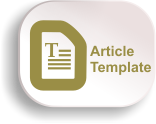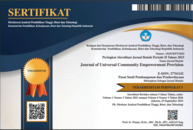Healthy Environmental Movement "Tree Planting In Coastal Areas," Dairi Regency, North Sumatra
DOI:
https://doi.org/10.55885/jucep.v5i2.714Keywords:
Community Service, Environment, Tree Planting, CollaborativeAbstract
A healthy and sustainable environment is a fundamental need for the survival of humans and other living things. However, various human activities such as deforestation, pollution, and urbanization have threatened the balance of the ecosystem. Tree Plants will help in maintaining the balance of nature and the surrounding ecosystem so that it will reduce the Negative Impact on Human Health. This Community Service Activity aims to provide Education to the Community and support the preservation of Nature as a vital source in maintaining the balance of the ecosystem and a healthy quality of life. The implementation method is to use a collaborative and participatory approach, emphasizing the importance of the involvement of synergy of various resources, expertise and experience in overcoming complex problems found, collaboration is considered the key to producing better results by combining various perspectives and resources. Community Participation can directly meet the real needs of the Community in a sustainable manner. With good environmental management and the availability of natural resources, it can create a healthy quality of life and the sustainability of the ecosystem in the future.
References
Adiaha, M. S., Buba, A. H., & Tangban, E. E. (2020). Mitigating global greenhouse gas emission: The role of trees as a clean mechanism for CO2 sequestration. Journal of Agricultural Sciences–Sri Lanka, 15(1). https://doi.org/10.4038/jas.v15i1.8675
Alemaw, B. F., & Simatele, D. (2020). Integrating climate change adaptation and mitigation into sustainable development planning: the policy dimension. In Climate Variability and Change in Africa: Perspectives, Experiences and Sustainability (pp. 191-208). Cham: Springer International Publishing. https://doi.org/10.1007/978-3-030-31543-6_15
Arifin, R., Masyhar, A., Sumardiana, B., Ramada, D. P., Kamal, U., & Fikri, S. (2024, June). Indonesian sustainable development policy: How the government ensures the environment for future generations. In IOP Conference Series: Earth and Environmental Science (Vol. 1355, No. 1, p. 012005). IOP Publishing. https://doi.org/10.1088/1755-1315/1355/1/012005
Cahyaningsih, A. P., Deanova, A. K., Pristiawati, C. M., Ulumuddin, Y. I., Kusumaningrum, L., & Setyawan, A. D. (2022). Causes and impacts of anthropogenic activities on mangrove deforestation and degradation in Indonesia. International Journal of Bonorowo Wetlands, 12(1). https://doi.org/10.13057/bonorowo/w120102
Chang, K. K. P., Wong, F. K. Y., Chan, K. L., Wong, F., Ho, H. C., Wong, M. S., ... & Yang, L. (2020). The impact of the environment on the quality of life and the mediating effects of sleep and stress. International Journal of Environmental Research and Public Health, 17(22), 8529. https://doi.org/10.3390/ijerph17228529
Corvalan, C., Villalobos Prats, E., Sena, A., Campbell-Lendrum, D., Karliner, J., Risso, A., ... & Vinci, S. (2020). Towards climate resilient and environmentally sustainable health care facilities. International Journal of Environmental Research and Public Health, 17(23), 8849. https://doi.org/10.3390/ijerph17238849
Dasandi, N., Graham, H., Lampard, P., & Mikhaylov, S. J. (2021). Engagement with health in national climate change commitments under the Paris Agreement: a global mixed-methods analysis of the nationally determined contributions. The Lancet Planetary Health, 5(2), e93-e101.
Dawson, N. M., Coolsaet, B., Sterling, E. J., Loveridge, R., Gross-Camp, N. D., Wongbusarakum, S., ... & Rosado-May, F. J. (2021). The role of Indigenous peoples and local communities in effective and equitable conservation. Ecology and society, 26(3), 19. https://doi.org/10.5751/ES-12625-260319
Dodson, J., Dérer, P., Cafaro, P., & Götmark, F. (2022). Population growth, family planning and the Paris Agreement: an assessment of the nationally determined contributions (NDCs). International Environmental Agreements: Politics, Law and Economics, 22(3), 561-576. https://doi.org/10.1007/s10784-022-09573-8
Fatimah, Y. A., Govindan, K., Murniningsih, R., & Setiawan, A. (2020). Industry 4.0 based sustainable circular economy approach for smart waste management system to achieve sustainable development goals: A case study of Indonesia. Journal of cleaner production, 269, 122263. https://doi.org/10.1016/j.jclepro.2020.122263
Fleischman, F., Basant, S., Chhatre, A., Coleman, E. A., Fischer, H. W., Gupta, D., ... & Veldman, J. W. (2020). Pitfalls of tree planting show why we need people-centered natural climate solutions. BioScience, 70(11), 947-950. https://doi.org/10.1093/biosci/biaa094
Gopamma, D., Kumar, K. S., Srinivas, N., Debnath, S., Ram, A., Kumar, S., & Arunachalam, A. (2024). Air Pollution Tolerance and Carbon Sequestration Potential of Tree Species to Combat Climate Change. In Agroforestry Solutions for Climate Change and Environmental Restoration (pp. 301-319). Singapore: Springer Nature Singapore. https://doi.org/10.1007/978-981-97-5004-7_14
He, Z., & Tong, P. (2024). Study on the Biological Characteristics and Efficient Management Techniques of the New Fruit Akebia trifoliata. International Journal of Horticulture, 14.
Iyiola, A. O., Akinrinade, A. J., & Ajayi, F. O. (2022). Effects of Water pollution on biodiversity along the coastal regions. In Biodiversity in Africa: Potentials, threats and conservation (pp. 345-367). Singapore: Springer Nature Singapore. https://doi.org/10.1007/978-981-19-3326-4_13
Nomura, K. (2009). A perspective on education for sustainable development: Historical development of environmental education in Indonesia. International Journal of Educational Development, 29(6), 621-627. https://doi.org/10.1016/j.ijedudev.2008.12.002
Ogunkan, D. V. (2022). Achieving sustainable environmental governance in Nigeria: A review for policy consideration. Urban Governance, 2(1), 212-220. https://doi.org/10.1016/j.ugj.2022.04.004
Rela, I. Z., Awang, A. H., Ramli, Z., Md Sum, S., & Meisanti, M. (2020). Effects of environmental corporate social responsibility on environmental well‐being perception and the mediation role of community resilience. Corporate Social Responsibility and Environmental Management, 27(5), 2176-2187. https://doi.org/10.1002/csr.1956
Selanon, P., & Chuangchai, W. (2023). The importance of urban green spaces in enhancing holistic health and sustainable well-being for people with disabilities: a narrative review. Buildings, 13(8), 2100. https://doi.org/10.3390/buildings13082100
Suhardono, S., Adicita, Y., Sari, M. M., Tehupeiory, A., & Suryawan, I. W. K. (2024). Coastal Degradation in Tanjung Uma, Batam City, Indonesia: A SWOT Analysis of Environmental Challenges and Opportunities. Indonesian Journal of Social and Environmental Issues (IJSEI), 5(1), 88-98. https://doi.org/10.47540/ijsei.v5i1.1060
Vincent, B. C. (2024). Natural Forest Regeneration and Tree Planting Complexity: An Enigma of Climate Mitigation in the World of Technology. Journal of the Kenya National Commission for UNESCO, 4(1), 1-17.
Wang, D., Xu, P. Y., An, B. W., & Guo, Q. P. (2024). Urban green infrastructure: Bridging biodiversity conservation and sustainable urban development through adaptive management approach. Frontiers in Ecology and Evolution, 12, 1440477. https://doi.org/10.3389/fevo.2024.1440477
Xiong, Y., Guo, H., Nor, D. D. M. M., Song, A., & Dai, L. (2023). Mineral resources depletion, environmental degradation, and exploitation of natural resources: COVID-19 aftereffects. Resources Policy, 85, 103907. https://doi.org/10.1016/j.resourpol.2023.103907
Yu, Y., Zhang, W., Fu, P., Huang, W., Li, K., & Cao, K. (2020). The spatial optimization and evaluation of the economic, ecological, and social value of urban green space in Shenzhen. Sustainability, 12(5), 1844. https://doi.org/10.3390/su12051844

Downloads
Published
How to Cite
Issue
Section
License
Copyright (c) 2025 Journal of Universal Community Empowerment Provision

This work is licensed under a Creative Commons Attribution-ShareAlike 4.0 International License.















